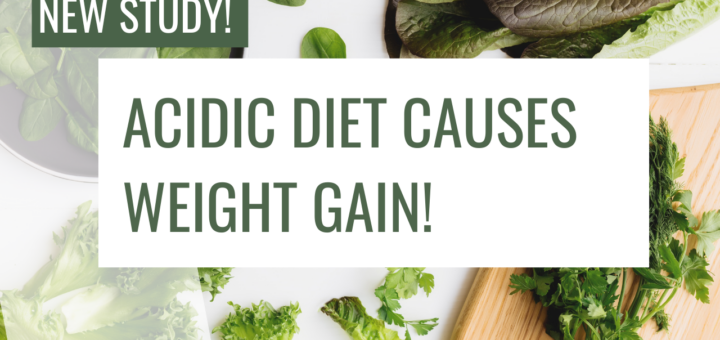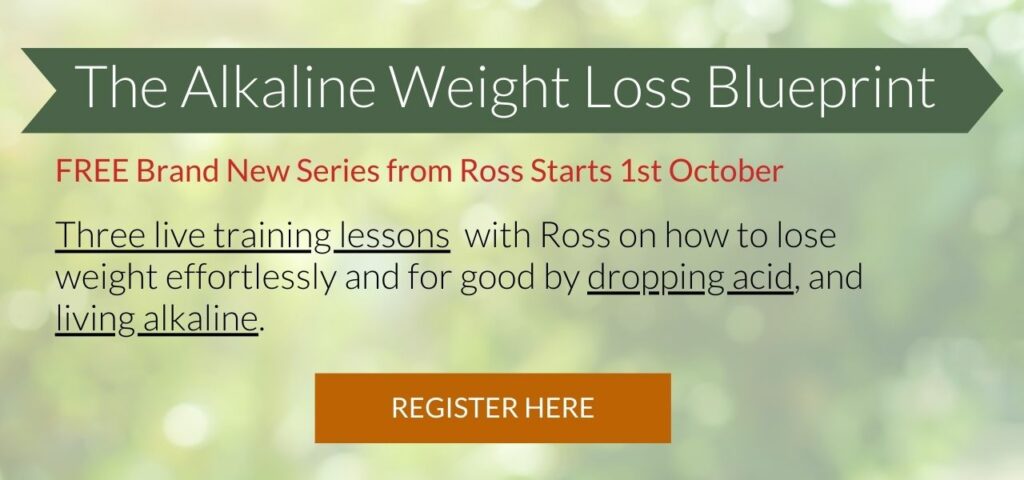Study: Acidic Diet Leads to Weight Gain
Acidic Diet Significantly Increases Risk of Weight Gain & Obesity
REGISTER HERE for the Alkaline Weight Loss Blueprint Series (Free)
Transcript of the Alkaline Weight Loss Study Video:
Hey guys Ross here and today I wanted to share this important study with you regarding eating an acidic diet, and the increased risk of weight gain.
We’ve talked in previous videos about an acidic diet and increased risk of hypertension, CVD, NAFLD, Arterial Disease, Osteoporosis, Kidney Disease, and cancers such as breast, colorectal, bladder, oesophageal, pancreatic, prostate and so on…and of course, we already know about the increased risk of weight gain due to an acidic diet being so strongly associated with increased risk of insulin resistance and type 2 diabetes.
Now we know that when we consume an acidic diet we activate several mechanisms by which the body will create a ton of fat cells, and then want to hold on to them. We know that adrenal stress causes this, chronic inflammation, immune overactivity, digestive imbalance, liver stress…these are all pathways that lead to the body creating visceral fat cells, and then holding onto them.
So the goal to sustainable, long-term, fat loss is NOT to starve the body, but rather to remove these imbalances and stresses, and give the body the nutrients to heal. Fat loss isn’t about calorie counting at all costs, but rather about giving the body the nutrients it needs to heal, so it can effortlessly release these fat cells, and rebalance.
And that’s what todays study shows us too.
The study Higher dietary acid load potentially increases serum triglyceride and obesity prevalence in adults published in PLOS ONE – a super highly regarded, peer reviewed journal is a systemic meta-analysis which looked at any study until 2019 that checked for any associations between an acidic with things like Body Mass Index (BMI), waist size, levels of different cholesterols, and the occurrence of obesity.
They started with 621 studies, but applying the nine-star Newcastle-Ottawa scale (NOS) for quality assessment of studies (where studies with 7 stars or more are considered high quality) they ended up with the 32 highest quality, 9-star studies.
This is really important, because it is so easy to use huge amounts of studies and massive data sets to look for little correlations. The researchers have absolutely gone to extreme lengths here to use only the most reputable studies in their analysis.
And what they have found is that in both adult men and women – the more acidic your diet, the greater the likelihood of obesity.
We’ve seen, as we touched on earlier, hundreds of papers that have shown that an acidic diet, or as the studies call it ‘diet-induced acidosis’ or ‘high dietary acid load’ implicated in all of the building blocks of weight gain.
And this study categorically shows us that the more acidic your diet, the more weight you will gain, and therefore, the more alkaline-forming, the less weight gain.
Unsurprisingly, when drilling into the data, the researchers found the results were particularly pronounced when the diet included high levels of gluten and refined grains.
Look, the body doesn’t just gain fat cells because of the number of calories we eat. A calorie is a measure of a unit of energy. Calories is just one part of the representation of the bigger picture. The bigger picture is that your body gains and holds on to fat when it is out of balance and under stress.
And it is absolutely abundantly clear that an acidic diet causes this imbalance and stress.
A further study in the Journal of Cardiovascular and Thoracic Research in late 2021 confirmed these findings. This study including 306 healthy 20 to 55 year-old women found that with each measured increase of dietary-acid load, there is a significant increase in the likelihood or odds of obesity and abdominal adiposity (accumulation of fat in the abdominal area).
We’ve got to get the acidity out, and get the alkalinity it. And thats where I can help, because I have almost 20 years of teaching this, and how to make it so easy and achievable.
When you give your body the tools it needs to thrive, weight loss becomes effortless. I’ve seen this with my clients over and over and over.
And over 3 days, I am running a series of three live lessons where I teach you my Alkaline Weight Loss Blueprint. Each of the three sessions will be live and there will be tons of opportunities to ask me questions, and learn how to get alkaline in those specific ways to ignite your weight loss.
We will be live on the 1st, 2nd, and 3rd October at 4pm EST. And if you register you’ll get the links to all of the replays too after the sessions are finished.
You can register for this free series below this video (CLICK HERE), and I cant wait to see you on the live calls.
References:
Obesity Study One:
Abbasalizad Farhangi, Mahdieh, Leila Nikniaz, and Zeinab Nikniaz. 2019. “Higher Dietary Acid Load Potentially Increases Serum Triglyceride and Obesity Prevalence in Adults: An Updated Systematic Review and Meta-Analysis.” Edited by Raffaele Serra. PLOS ONE 14 (5): e0216547. https://doi.org/10.1371/journal.pone.0216547.
Obesity Study Two:
Somaye Fatahi, Mostafa Qorbani, Pamela J Surkan, and Leila Azadbakht. 2021. “Associations between Dietary Acid Load and Obesity among Iranian Women.” Journal of Cardiovascular and Thoracic Research 13 (4): 285–97. https://doi.org/10.34172/jcvtr.2021.44.
Other studies referenced:
Frassetto, Lynda, Tanushree Banerjee, Neil Powe, and Anthony Sebastian. 2018. “Acid Balance, Dietary Acid Load, and Bone Effects—a Controversial Subject.” Nutrients 10 (4): 517. https://doi.org/10.3390/nu10040517.
Hejazi, Ehsan, Hadi Emamat, Maryam Sharafkhah, Atoosa Saidpour, Hossein Poustchi, Sadaf Sepanlou, Masoud Sotoudeh, et al. n.d. “Dietary Acid Load and Mortality from All Causes, CVD and Cancer: Results from the Golestan Cohort Study.” British Journal of Nutrition, 1–7. Accessed February 4, 2022. https://doi.org/10.1017/S0007114521003135.
Krupp, Danika, Jonas Esche, Gert Mensink, Stefanie Klenow, Michael Thamm, and Thomas Remer. 2018. “Dietary Acid Load and Potassium Intake Associate with Blood Pressure and Hypertension Prevalence in a Representative Sample of the German Adult Population.” Nutrients 10 (1): 103. https://doi.org/10.3390/nu10010103.
Louise, Jessica C Kiefte-de, Nicole S Erler, Robert, Ewout J Hoorn, M. Arfan Ikram, Harry L.A. Janssen, Herold J Metselaar, Oscar H Franco, and Sarwa Darwish Murad. 2019. “Diet-Dependent Acid Load—the Missing Link between an Animal Protein–Rich Diet and Nonalcoholic Fatty Liver Disease?” 104 (12): 6325–37. https://doi.org/10.1210/jc.2018-02792.
Mazidi, Mohsen, Dimitri P. Mikhailidis, and Maciej Banach. 2018. “Higher Dietary Acid Load Is Associated with Higher Likelihood of Peripheral Arterial Disease among American Adults.” Journal of Diabetes and Its Complications 32 (6): 565–69. https://doi.org/10.1016/j.jdiacomp.2018.03.001.
M Storz, W Martínez-López, J Calderón, and W Golomar. n.d. “HIGH DIETARY ACID LOAD IS ASSOCIATED with PROSTATE CANCER RISK: AN EPIDEMIOLOGICAL STUDY. This Work Is Licensed under a Creative Commons Attribution-NonCommercial-ShareAlike 4.0 International License.” https://www.wcrj.net/wp-content/uploads/sites/5/2021/11/e2119.pdf.
Naeini, Zeinab, Faezeh Abaj, Zahra Esmaeily, Ehsan Alvandi, Masoumeh Rafiee, and Fariba Koohdani. 2022. “A Nutrigenetic Approach to Investigate ApoB EcoR1 Polymorphism–Dietary Acid Load Interactions on Lipid and Anthropometric-Related Outcomes in Adults with Dyslipidemic Type 2 Diabetes.” Lifestyle Genomics, December. https://doi.org/10.1159/000528656.
Passey, Caroline. 2017. “Reducing the Dietary Acid Load: How a More Alkaline Diet Benefits Patients with Chronic Kidney Disease.” Journal of Renal Nutrition 27 (3): 151–60. https://doi.org/10.1053/j.jrn.2016.11.006.
Ronco, Alvaro Luis, Wilner Martínez‐López, Juan M. Calderón, and Maximilian Andreas Storz. 2022. “Dietary Acid Load and Esophageal Cancer Risk: A Case‐Control Study.” Thoracic Cancer 13 (19): 2759–66. https://doi.org/10.1111/1759-7714.14612.
Ronco, Alvaro, Maximilian A. Storz, Wilner Martínez-López, Juan M. Calderón, and Wilson Golomar. 2022. “Dietary Acid Load and Bladder Cancer Risk: An Epidemiologic Case-Control Study.” Multidisciplinary Cancer Investigation 6 (2): 1–12. https://doi.org/10.30699/mci.6.2.284-2.
Ronco, Alvaro L., Wilner Martínez-López, Beatriz Mendoza, and Juan M. Calderón. 2021. “Epidemiologic Evidence for Association between a High Dietary Acid Load and the Breast Cancer Risk.” SciMedicine Journal 3 (2): 166–76. https://doi.org/10.28991/scimedj-2021-0302-8.
Shi, Li-Wei, Yi-Lin Wu, Jie-Jun Hu, Peng-Fei Yang, Wei-Ping Sun, Jian Gao, Kang Wang, Yang Peng, Jing-Jing Wu, and Guo-Chao Zhong. 2021. “Dietary Acid Load and the Risk of Pancreatic Cancer: A Prospective Cohort Study.” Cancer Epidemiology Biomarkers & Prevention, February. https://doi.org/10.1158/1055-9965.epi-20-1293.
Tran, Tao Thi, Madhawa Gunathilake, Jeonghee Lee, Jae Hwan Oh, Hee Jin Chang, Dae Kyung Sohn, Aesun Shin, and Jeongseon Kim. 2023. “The Association of Diet-Dependent Acid Load with Colorectal Cancer Risk: A Case–Control Study in Korea.” British Journal of Nutrition, August, 1–10. https://doi.org/10.1017/S0007114523001691.







Another quick point:
Have you noticed that most of the people you know or see who were fat last year are fatter this year? (even kids, sadly enough). At least this is what i have seen.
Hi Ross – thanks for your diligence and focus, and wanting to help humanity. Another factor you might consider:
Evidence is piling up that wireless radiation (think: most peoples’ closest companion, that cute little cellphone in your pocket) has a strong link to metabolic syndrome, some features of which are obesity, insulin resistance, and diabetes.
One thing that has changed even more drastically than diet in the last 25 to 30 years is our consumption of microwave (radio-frequency) radiation, from the womb to the tomb.
Arthur Firstenberg, a longtime microwave researcher, recently posted the following excerpt in his substack article HUMANS, BEES AND WILDLIFE IN 2023
https://arthurfirstenberg.substack.com/p/healthtrends2023
“Cell phone impacts on our health & environment
“Incredible rise in obesity and heart conditions
“In April 2023, the British Heart Foundation published statistics revealing a shocking prevalence of obesity and heart disease. 64% of all adults 16 years of age and older in the UK today are overweight or obese. And 30% of all children aged 2-15 are overweight or obese.
“The number of prescriptions used in the prevention and treatment of heart disease in England rose from 46,252 in 1981 to 332,575 in 2020. The sharpest rise occurred between 1996 (91,037 prescriptions) and 2006 (234,793 prescriptions), the years when most of the population acquired mobile phones.”
—————————
And who knows, maybe the massive increase in wireless radiation is also making people’s systems more acidic; maybe that is part of the carnage.
All best to you and your readers,
janhavi